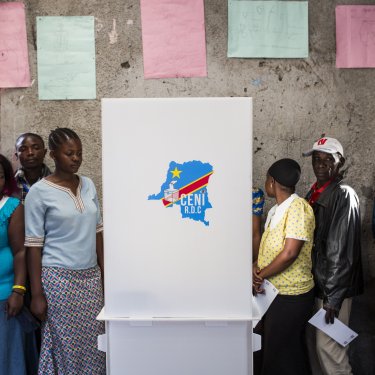Censorship during vote count is counter-productive, RSF warns DRC

As the vote count drags on after the presidential and legislative elections held in theDemocratic Republic of Congo on 30 December, Reporters Without Borders (RSF)condemns the systematic and growing censorship and calls on the Congolese authorities to stop obstructing the media and journalists.
In the course of denying the public access to news and information, the authorities have disconnected the Internet, withdrawn the accreditation of Radio France Internationale’s correspondent and disconnected the radio broadcaster’s main transmitters. The authorities ordered the suspension of access to the Internet, social networks and mobile phone texting services with the declared aim of “preserving public order.” Reuters has quoted President Joseph Kabila’s chief adviser as saying these measures, which are preventing journalists from working and are blocking the flow of information, could remain in effect until the elections results are announced – on 6 January at the latest.
One of the most widely used sources of news in the DRC, Radio France Internationale is itself also being targeted. Its signal is now almost inaccessible as most of its transmitters were disconnected yesterday. In a letter notifying RFI that he was withdrawing the accreditation of its correspondent, Florence Morice, communication and media minister Lambert Mende Omalanga accused her of giving unofficial provisional results on the air. RFI issued a statement defending her professionalism and calling for its broadcast signal to be restored.
“By disconnecting the Internet and obstructing the broadcasts of a leading international radio station that is very popular in the DRC, the Congolese authorities are depriving journalists of an essential work tool and depriving the public of the access to information they need during a presidential election that was delayed for two years,” said Arnaud Froger, the head of RSF’s Africa desk.“The preservation of public order cannot be used justify systematic recourse to censorship. Such a strategy is counter-productive as well as draconian. Preventing journalists and media outlets from working just fuels suspicion and seriously undermines the transparency – and therefore the credibility – of any election.”
The disconnections have been condemned by several western foreign ministries, including those of the United States and European Union, which issued a joint statement calling on the government “to not block access to the Internet and media.”
The DRC is one of Africa’s worst online censors. RSF and its local partner organization, Journalist in Danger (JED), had voiced concern about the possibility of such cuts on the eve of the election. In 2017, RSF urged telephone service providers such as Orange to stand by their commitment to freedom of information and to resist the Congolese government’s censorship requests.
RSF registered more abuses against journalists and the media in the DRC in 2018 than in any other country in sub-Saharan Africa. The DRC is ranked 154th out of 180 countries in RSF’s 2018 World Press Freedom Index.



